Emotional Intelligence: Self-Assessment and Application Report
VerifiedAdded on 2023/05/30
|11
|1758
|176
Report
AI Summary
This report delves into the significance of emotional intelligence (EQ) in fostering a positive workplace environment. It presents a personal EQ self-assessment conducted on two online platforms, analyzing and comparing the results with pre-existing beliefs, ultimately confirming their accuracy. The report further addresses emotional triggers within the workplace, emphasizing the importance of cultural EQ, particularly in the Australian context, and suggests strategies for enhancing inclusivity. It concludes with a comprehensive analysis of the multifaceted discussion surrounding emotional intelligence and its practical applications in professional settings. Desklib offers a wealth of similar resources, including past papers and solved assignments, to aid students in their studies.
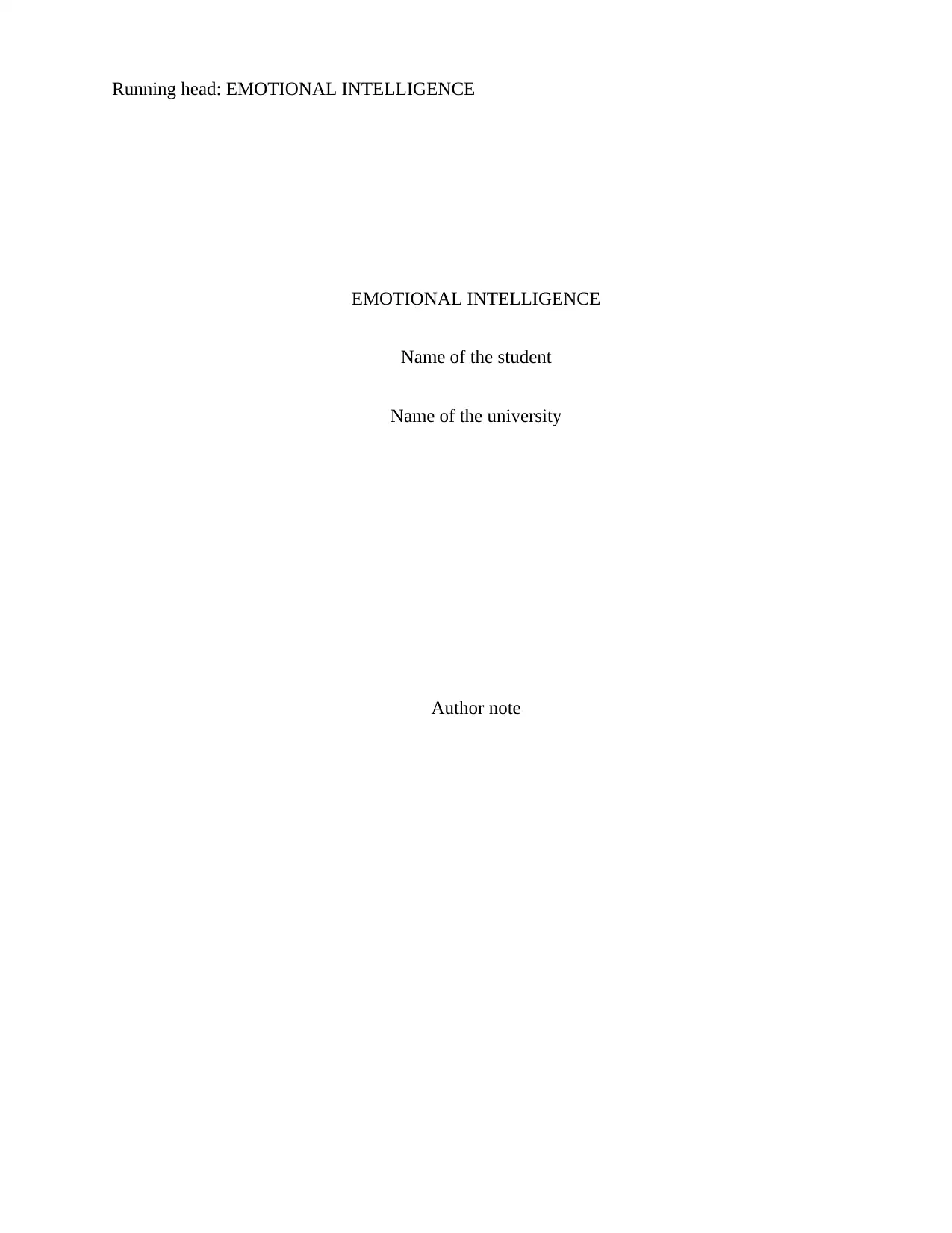
Running head: EMOTIONAL INTELLIGENCE
EMOTIONAL INTELLIGENCE
Name of the student
Name of the university
Author note
EMOTIONAL INTELLIGENCE
Name of the student
Name of the university
Author note
Paraphrase This Document
Need a fresh take? Get an instant paraphrase of this document with our AI Paraphraser
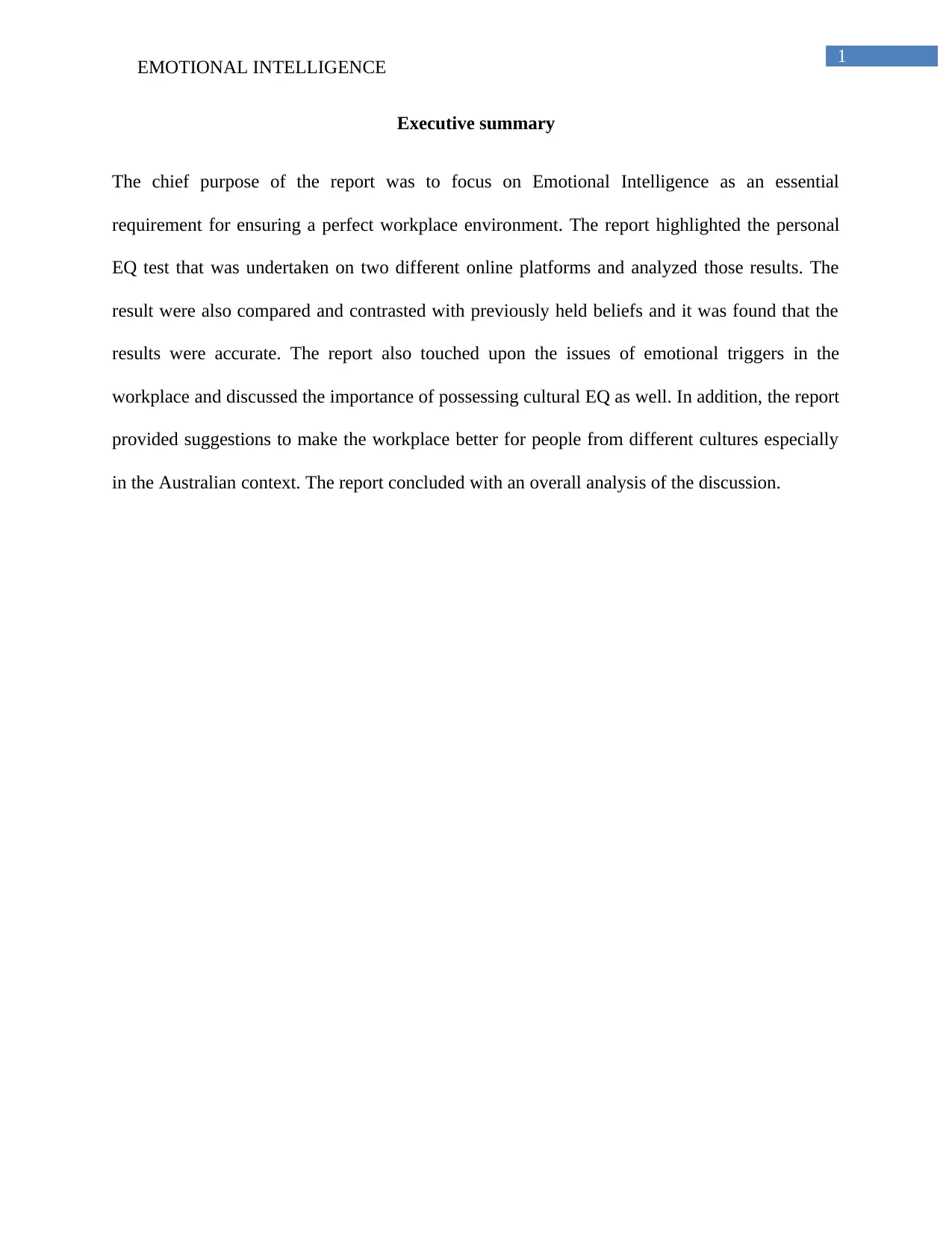
1
EMOTIONAL INTELLIGENCE
Executive summary
The chief purpose of the report was to focus on Emotional Intelligence as an essential
requirement for ensuring a perfect workplace environment. The report highlighted the personal
EQ test that was undertaken on two different online platforms and analyzed those results. The
result were also compared and contrasted with previously held beliefs and it was found that the
results were accurate. The report also touched upon the issues of emotional triggers in the
workplace and discussed the importance of possessing cultural EQ as well. In addition, the report
provided suggestions to make the workplace better for people from different cultures especially
in the Australian context. The report concluded with an overall analysis of the discussion.
EMOTIONAL INTELLIGENCE
Executive summary
The chief purpose of the report was to focus on Emotional Intelligence as an essential
requirement for ensuring a perfect workplace environment. The report highlighted the personal
EQ test that was undertaken on two different online platforms and analyzed those results. The
result were also compared and contrasted with previously held beliefs and it was found that the
results were accurate. The report also touched upon the issues of emotional triggers in the
workplace and discussed the importance of possessing cultural EQ as well. In addition, the report
provided suggestions to make the workplace better for people from different cultures especially
in the Australian context. The report concluded with an overall analysis of the discussion.
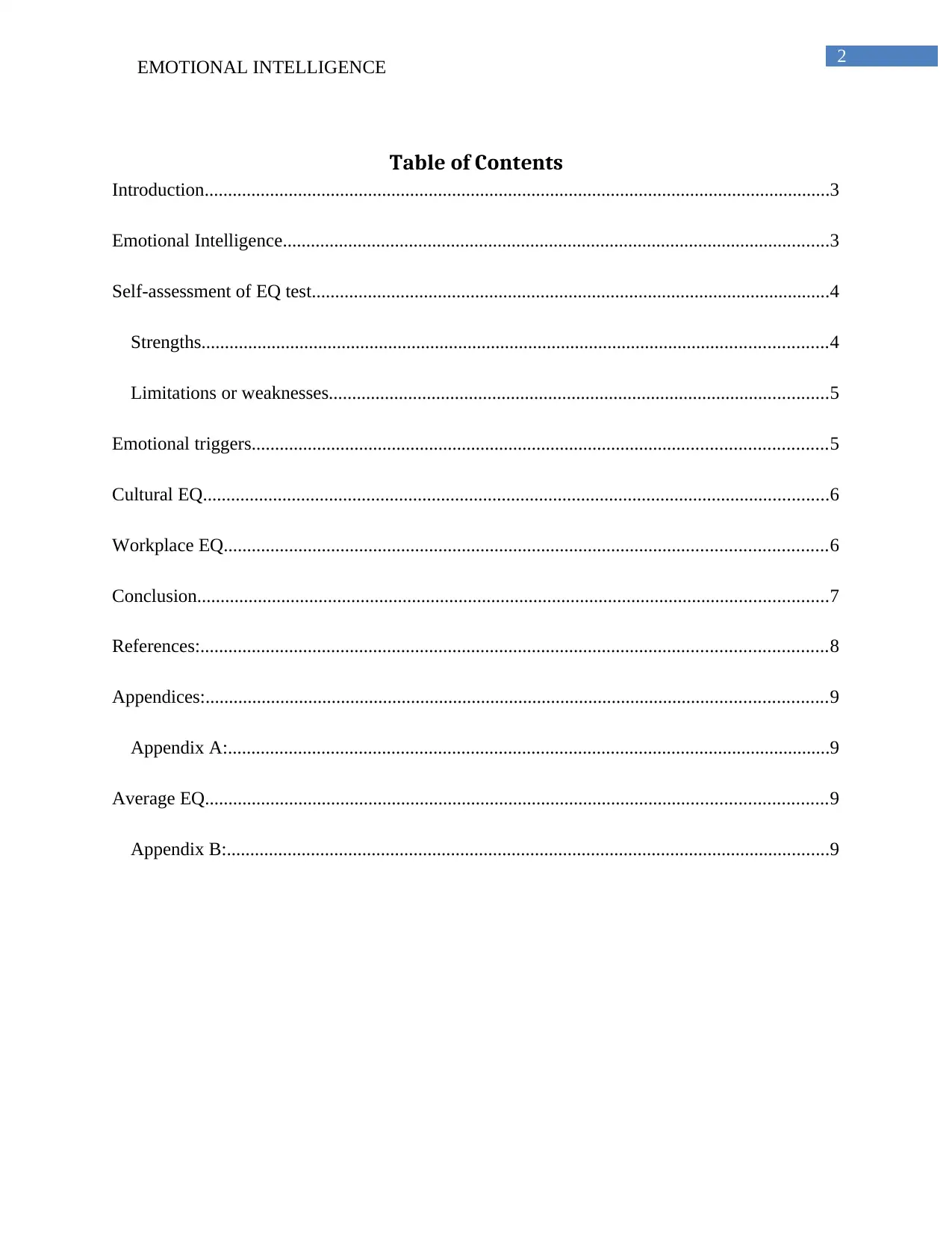
2
EMOTIONAL INTELLIGENCE
Table of Contents
Introduction......................................................................................................................................3
Emotional Intelligence.....................................................................................................................3
Self-assessment of EQ test...............................................................................................................4
Strengths......................................................................................................................................4
Limitations or weaknesses...........................................................................................................5
Emotional triggers...........................................................................................................................5
Cultural EQ......................................................................................................................................6
Workplace EQ.................................................................................................................................6
Conclusion.......................................................................................................................................7
References:......................................................................................................................................8
Appendices:.....................................................................................................................................9
Appendix A:.................................................................................................................................9
Average EQ.....................................................................................................................................9
Appendix B:.................................................................................................................................9
EMOTIONAL INTELLIGENCE
Table of Contents
Introduction......................................................................................................................................3
Emotional Intelligence.....................................................................................................................3
Self-assessment of EQ test...............................................................................................................4
Strengths......................................................................................................................................4
Limitations or weaknesses...........................................................................................................5
Emotional triggers...........................................................................................................................5
Cultural EQ......................................................................................................................................6
Workplace EQ.................................................................................................................................6
Conclusion.......................................................................................................................................7
References:......................................................................................................................................8
Appendices:.....................................................................................................................................9
Appendix A:.................................................................................................................................9
Average EQ.....................................................................................................................................9
Appendix B:.................................................................................................................................9
⊘ This is a preview!⊘
Do you want full access?
Subscribe today to unlock all pages.

Trusted by 1+ million students worldwide
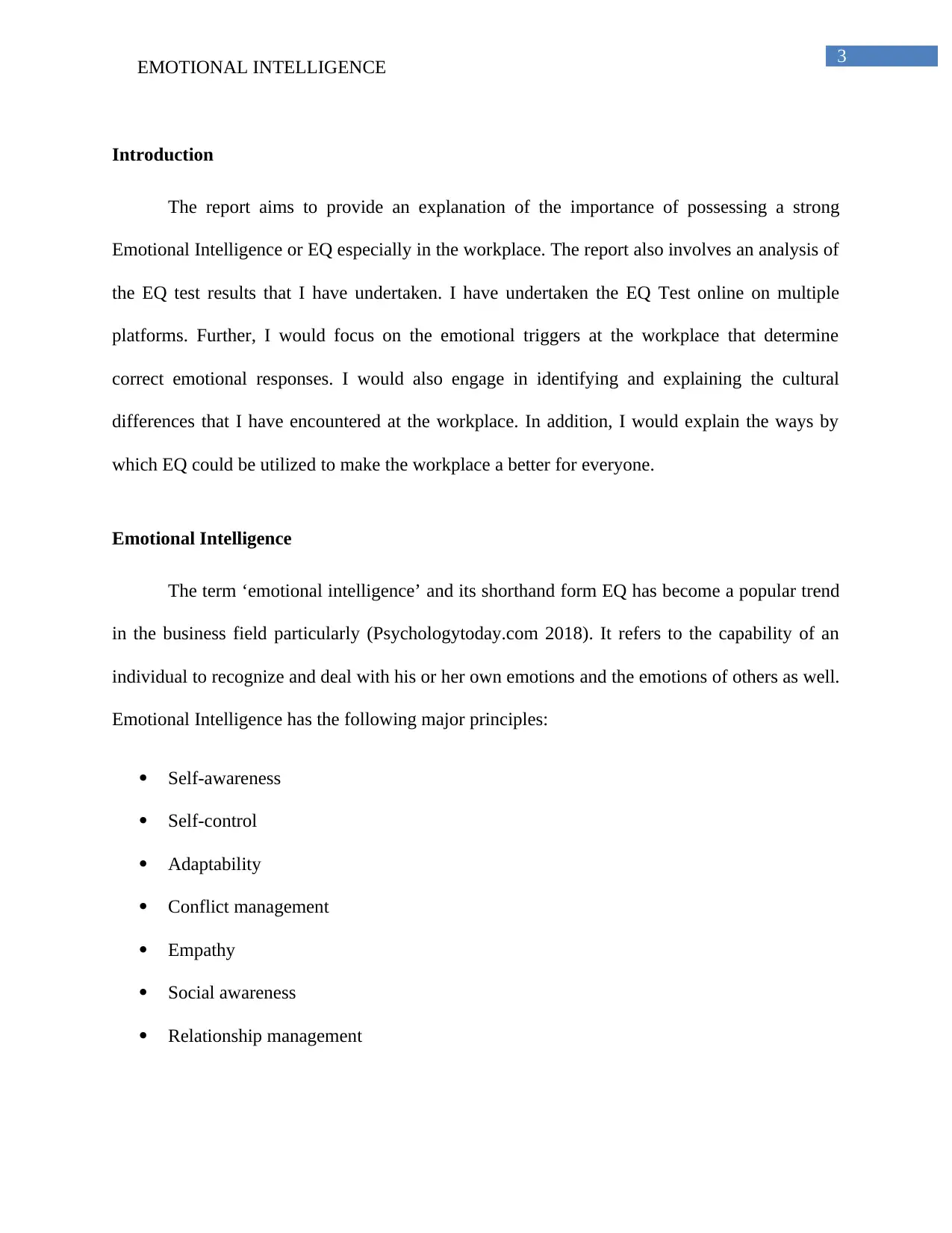
3
EMOTIONAL INTELLIGENCE
Introduction
The report aims to provide an explanation of the importance of possessing a strong
Emotional Intelligence or EQ especially in the workplace. The report also involves an analysis of
the EQ test results that I have undertaken. I have undertaken the EQ Test online on multiple
platforms. Further, I would focus on the emotional triggers at the workplace that determine
correct emotional responses. I would also engage in identifying and explaining the cultural
differences that I have encountered at the workplace. In addition, I would explain the ways by
which EQ could be utilized to make the workplace a better for everyone.
Emotional Intelligence
The term ‘emotional intelligence’ and its shorthand form EQ has become a popular trend
in the business field particularly (Psychologytoday.com 2018). It refers to the capability of an
individual to recognize and deal with his or her own emotions and the emotions of others as well.
Emotional Intelligence has the following major principles:
Self-awareness
Self-control
Adaptability
Conflict management
Empathy
Social awareness
Relationship management
EMOTIONAL INTELLIGENCE
Introduction
The report aims to provide an explanation of the importance of possessing a strong
Emotional Intelligence or EQ especially in the workplace. The report also involves an analysis of
the EQ test results that I have undertaken. I have undertaken the EQ Test online on multiple
platforms. Further, I would focus on the emotional triggers at the workplace that determine
correct emotional responses. I would also engage in identifying and explaining the cultural
differences that I have encountered at the workplace. In addition, I would explain the ways by
which EQ could be utilized to make the workplace a better for everyone.
Emotional Intelligence
The term ‘emotional intelligence’ and its shorthand form EQ has become a popular trend
in the business field particularly (Psychologytoday.com 2018). It refers to the capability of an
individual to recognize and deal with his or her own emotions and the emotions of others as well.
Emotional Intelligence has the following major principles:
Self-awareness
Self-control
Adaptability
Conflict management
Empathy
Social awareness
Relationship management
Paraphrase This Document
Need a fresh take? Get an instant paraphrase of this document with our AI Paraphraser
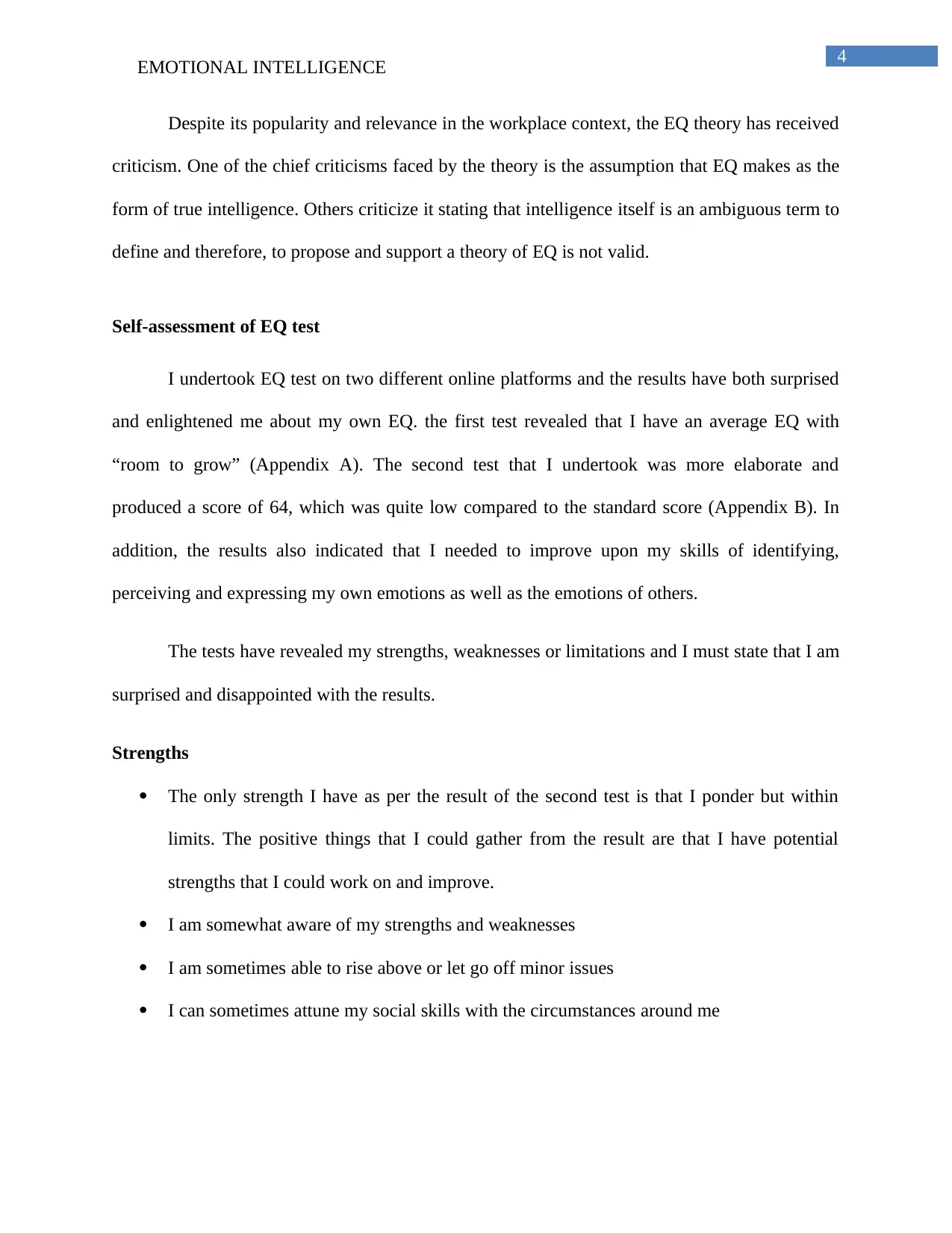
4
EMOTIONAL INTELLIGENCE
Despite its popularity and relevance in the workplace context, the EQ theory has received
criticism. One of the chief criticisms faced by the theory is the assumption that EQ makes as the
form of true intelligence. Others criticize it stating that intelligence itself is an ambiguous term to
define and therefore, to propose and support a theory of EQ is not valid.
Self-assessment of EQ test
I undertook EQ test on two different online platforms and the results have both surprised
and enlightened me about my own EQ. the first test revealed that I have an average EQ with
“room to grow” (Appendix A). The second test that I undertook was more elaborate and
produced a score of 64, which was quite low compared to the standard score (Appendix B). In
addition, the results also indicated that I needed to improve upon my skills of identifying,
perceiving and expressing my own emotions as well as the emotions of others.
The tests have revealed my strengths, weaknesses or limitations and I must state that I am
surprised and disappointed with the results.
Strengths
The only strength I have as per the result of the second test is that I ponder but within
limits. The positive things that I could gather from the result are that I have potential
strengths that I could work on and improve.
I am somewhat aware of my strengths and weaknesses
I am sometimes able to rise above or let go off minor issues
I can sometimes attune my social skills with the circumstances around me
EMOTIONAL INTELLIGENCE
Despite its popularity and relevance in the workplace context, the EQ theory has received
criticism. One of the chief criticisms faced by the theory is the assumption that EQ makes as the
form of true intelligence. Others criticize it stating that intelligence itself is an ambiguous term to
define and therefore, to propose and support a theory of EQ is not valid.
Self-assessment of EQ test
I undertook EQ test on two different online platforms and the results have both surprised
and enlightened me about my own EQ. the first test revealed that I have an average EQ with
“room to grow” (Appendix A). The second test that I undertook was more elaborate and
produced a score of 64, which was quite low compared to the standard score (Appendix B). In
addition, the results also indicated that I needed to improve upon my skills of identifying,
perceiving and expressing my own emotions as well as the emotions of others.
The tests have revealed my strengths, weaknesses or limitations and I must state that I am
surprised and disappointed with the results.
Strengths
The only strength I have as per the result of the second test is that I ponder but within
limits. The positive things that I could gather from the result are that I have potential
strengths that I could work on and improve.
I am somewhat aware of my strengths and weaknesses
I am sometimes able to rise above or let go off minor issues
I can sometimes attune my social skills with the circumstances around me
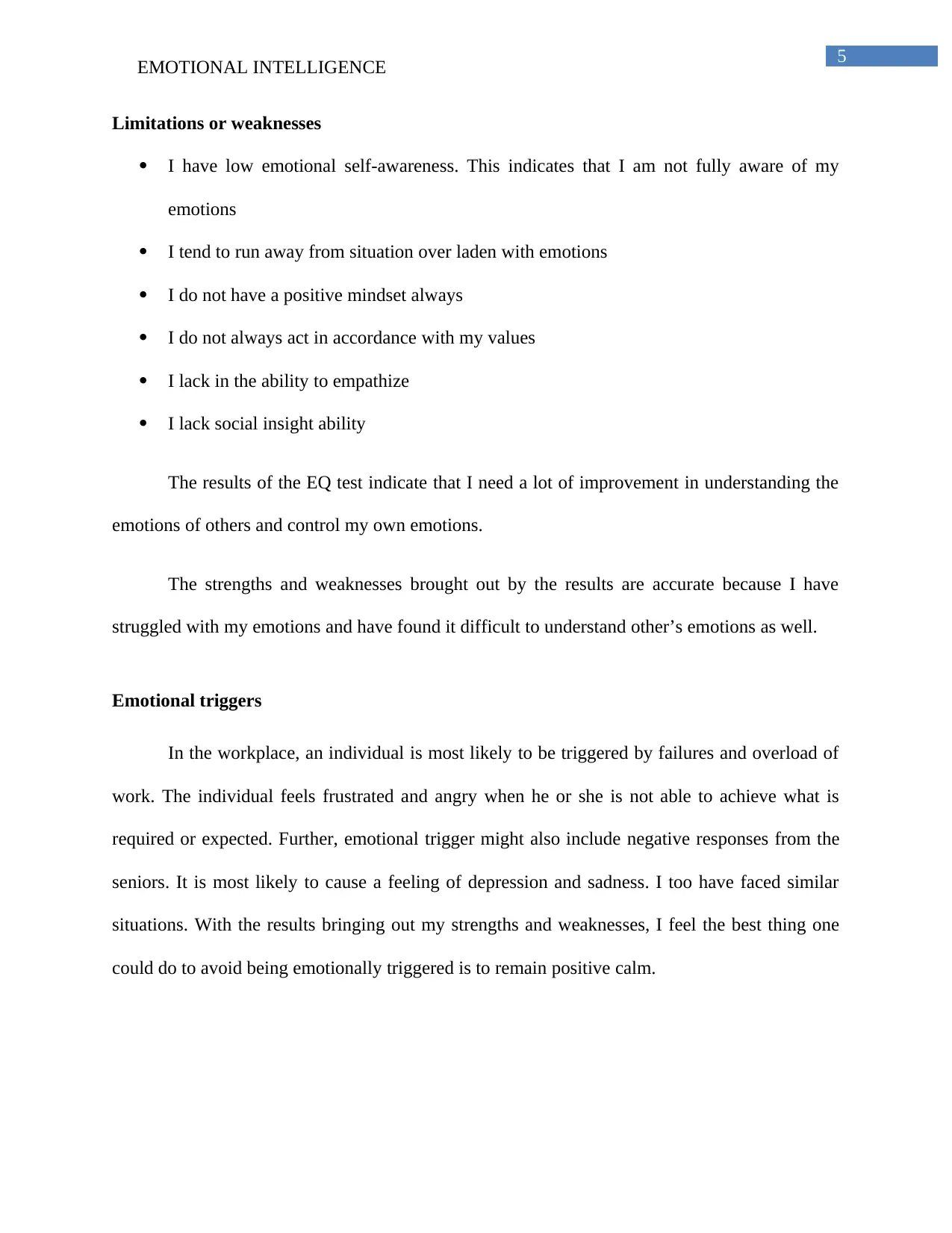
5
EMOTIONAL INTELLIGENCE
Limitations or weaknesses
I have low emotional self-awareness. This indicates that I am not fully aware of my
emotions
I tend to run away from situation over laden with emotions
I do not have a positive mindset always
I do not always act in accordance with my values
I lack in the ability to empathize
I lack social insight ability
The results of the EQ test indicate that I need a lot of improvement in understanding the
emotions of others and control my own emotions.
The strengths and weaknesses brought out by the results are accurate because I have
struggled with my emotions and have found it difficult to understand other’s emotions as well.
Emotional triggers
In the workplace, an individual is most likely to be triggered by failures and overload of
work. The individual feels frustrated and angry when he or she is not able to achieve what is
required or expected. Further, emotional trigger might also include negative responses from the
seniors. It is most likely to cause a feeling of depression and sadness. I too have faced similar
situations. With the results bringing out my strengths and weaknesses, I feel the best thing one
could do to avoid being emotionally triggered is to remain positive calm.
EMOTIONAL INTELLIGENCE
Limitations or weaknesses
I have low emotional self-awareness. This indicates that I am not fully aware of my
emotions
I tend to run away from situation over laden with emotions
I do not have a positive mindset always
I do not always act in accordance with my values
I lack in the ability to empathize
I lack social insight ability
The results of the EQ test indicate that I need a lot of improvement in understanding the
emotions of others and control my own emotions.
The strengths and weaknesses brought out by the results are accurate because I have
struggled with my emotions and have found it difficult to understand other’s emotions as well.
Emotional triggers
In the workplace, an individual is most likely to be triggered by failures and overload of
work. The individual feels frustrated and angry when he or she is not able to achieve what is
required or expected. Further, emotional trigger might also include negative responses from the
seniors. It is most likely to cause a feeling of depression and sadness. I too have faced similar
situations. With the results bringing out my strengths and weaknesses, I feel the best thing one
could do to avoid being emotionally triggered is to remain positive calm.
⊘ This is a preview!⊘
Do you want full access?
Subscribe today to unlock all pages.

Trusted by 1+ million students worldwide
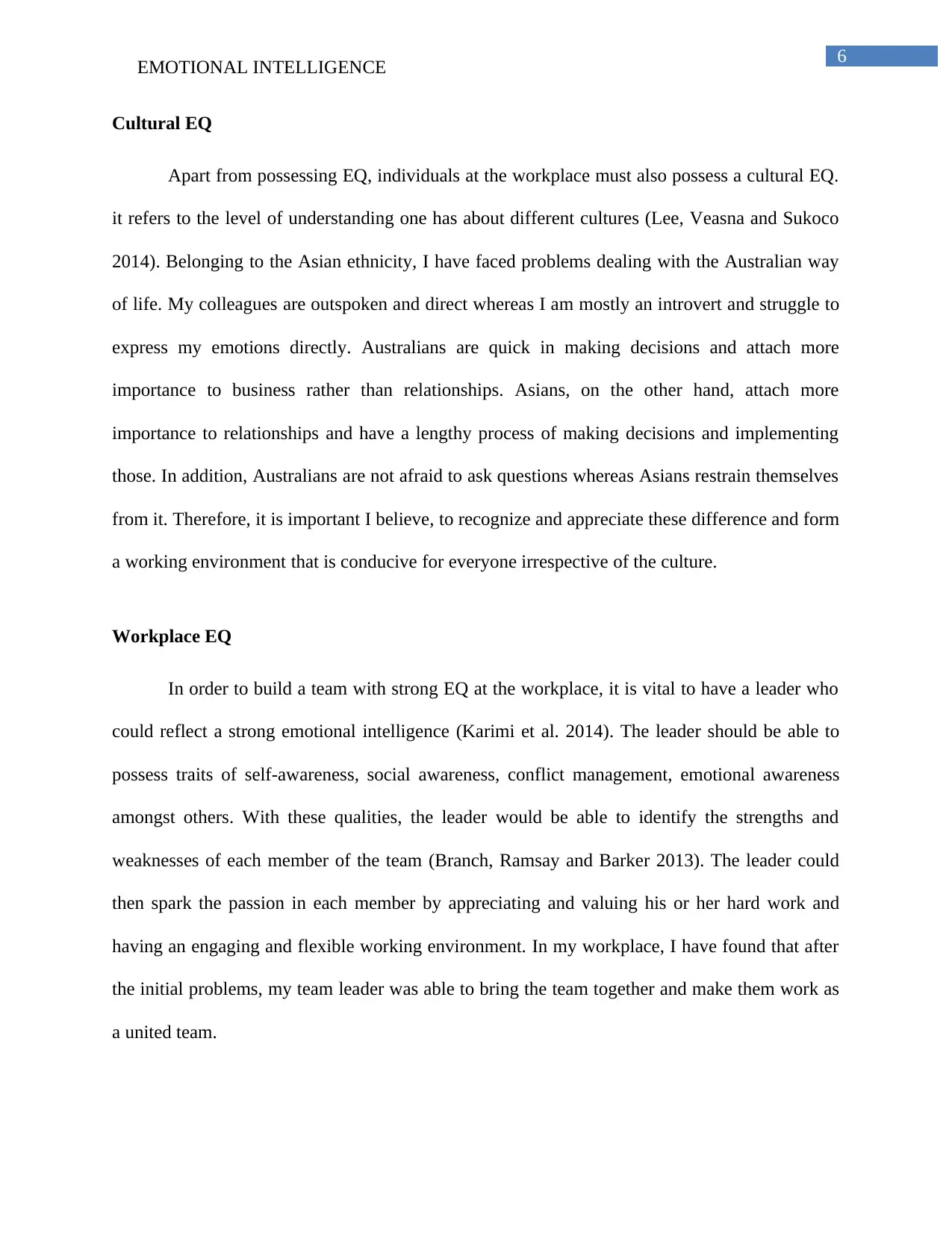
6
EMOTIONAL INTELLIGENCE
Cultural EQ
Apart from possessing EQ, individuals at the workplace must also possess a cultural EQ.
it refers to the level of understanding one has about different cultures (Lee, Veasna and Sukoco
2014). Belonging to the Asian ethnicity, I have faced problems dealing with the Australian way
of life. My colleagues are outspoken and direct whereas I am mostly an introvert and struggle to
express my emotions directly. Australians are quick in making decisions and attach more
importance to business rather than relationships. Asians, on the other hand, attach more
importance to relationships and have a lengthy process of making decisions and implementing
those. In addition, Australians are not afraid to ask questions whereas Asians restrain themselves
from it. Therefore, it is important I believe, to recognize and appreciate these difference and form
a working environment that is conducive for everyone irrespective of the culture.
Workplace EQ
In order to build a team with strong EQ at the workplace, it is vital to have a leader who
could reflect a strong emotional intelligence (Karimi et al. 2014). The leader should be able to
possess traits of self-awareness, social awareness, conflict management, emotional awareness
amongst others. With these qualities, the leader would be able to identify the strengths and
weaknesses of each member of the team (Branch, Ramsay and Barker 2013). The leader could
then spark the passion in each member by appreciating and valuing his or her hard work and
having an engaging and flexible working environment. In my workplace, I have found that after
the initial problems, my team leader was able to bring the team together and make them work as
a united team.
EMOTIONAL INTELLIGENCE
Cultural EQ
Apart from possessing EQ, individuals at the workplace must also possess a cultural EQ.
it refers to the level of understanding one has about different cultures (Lee, Veasna and Sukoco
2014). Belonging to the Asian ethnicity, I have faced problems dealing with the Australian way
of life. My colleagues are outspoken and direct whereas I am mostly an introvert and struggle to
express my emotions directly. Australians are quick in making decisions and attach more
importance to business rather than relationships. Asians, on the other hand, attach more
importance to relationships and have a lengthy process of making decisions and implementing
those. In addition, Australians are not afraid to ask questions whereas Asians restrain themselves
from it. Therefore, it is important I believe, to recognize and appreciate these difference and form
a working environment that is conducive for everyone irrespective of the culture.
Workplace EQ
In order to build a team with strong EQ at the workplace, it is vital to have a leader who
could reflect a strong emotional intelligence (Karimi et al. 2014). The leader should be able to
possess traits of self-awareness, social awareness, conflict management, emotional awareness
amongst others. With these qualities, the leader would be able to identify the strengths and
weaknesses of each member of the team (Branch, Ramsay and Barker 2013). The leader could
then spark the passion in each member by appreciating and valuing his or her hard work and
having an engaging and flexible working environment. In my workplace, I have found that after
the initial problems, my team leader was able to bring the team together and make them work as
a united team.
Paraphrase This Document
Need a fresh take? Get an instant paraphrase of this document with our AI Paraphraser
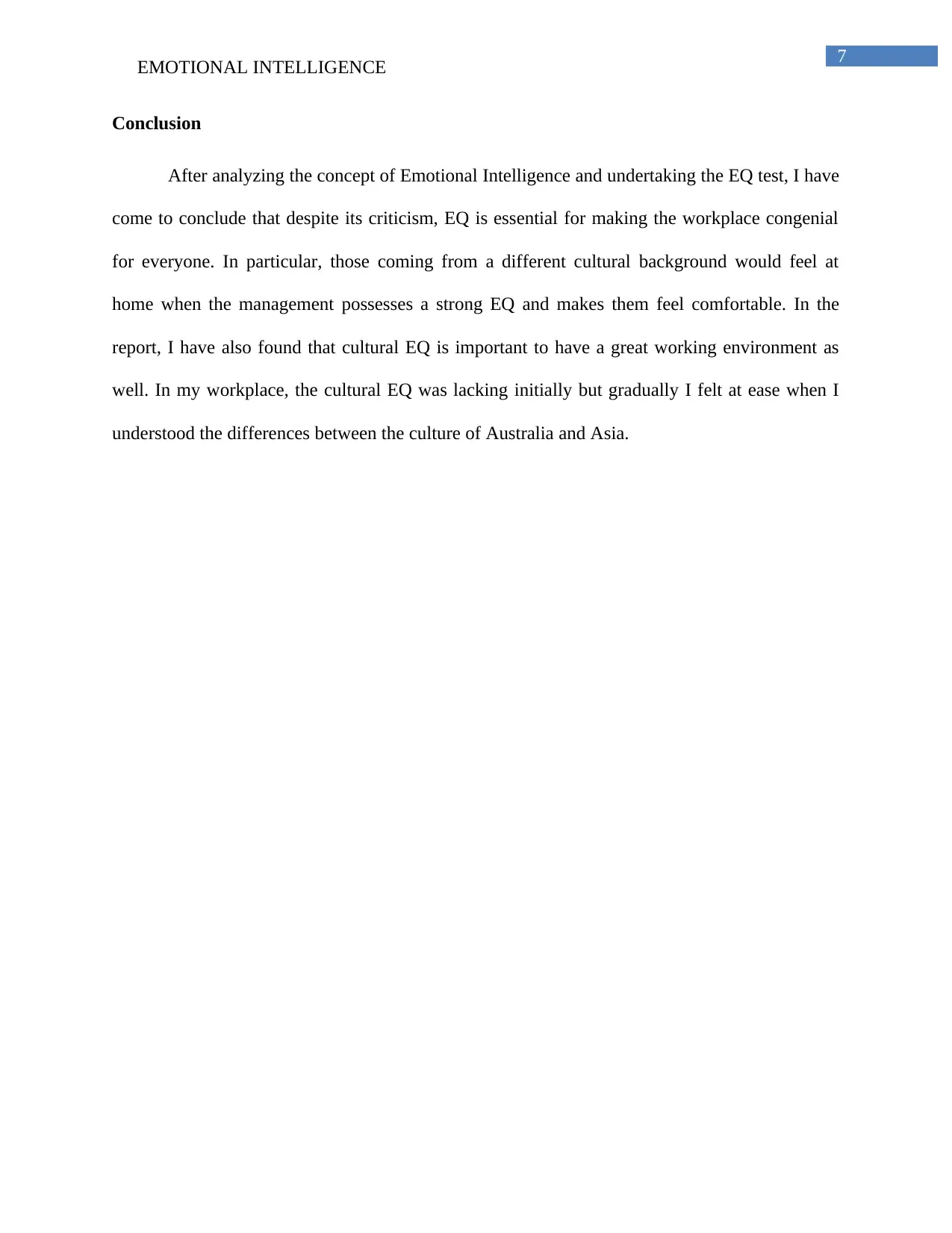
7
EMOTIONAL INTELLIGENCE
Conclusion
After analyzing the concept of Emotional Intelligence and undertaking the EQ test, I have
come to conclude that despite its criticism, EQ is essential for making the workplace congenial
for everyone. In particular, those coming from a different cultural background would feel at
home when the management possesses a strong EQ and makes them feel comfortable. In the
report, I have also found that cultural EQ is important to have a great working environment as
well. In my workplace, the cultural EQ was lacking initially but gradually I felt at ease when I
understood the differences between the culture of Australia and Asia.
EMOTIONAL INTELLIGENCE
Conclusion
After analyzing the concept of Emotional Intelligence and undertaking the EQ test, I have
come to conclude that despite its criticism, EQ is essential for making the workplace congenial
for everyone. In particular, those coming from a different cultural background would feel at
home when the management possesses a strong EQ and makes them feel comfortable. In the
report, I have also found that cultural EQ is important to have a great working environment as
well. In my workplace, the cultural EQ was lacking initially but gradually I felt at ease when I
understood the differences between the culture of Australia and Asia.
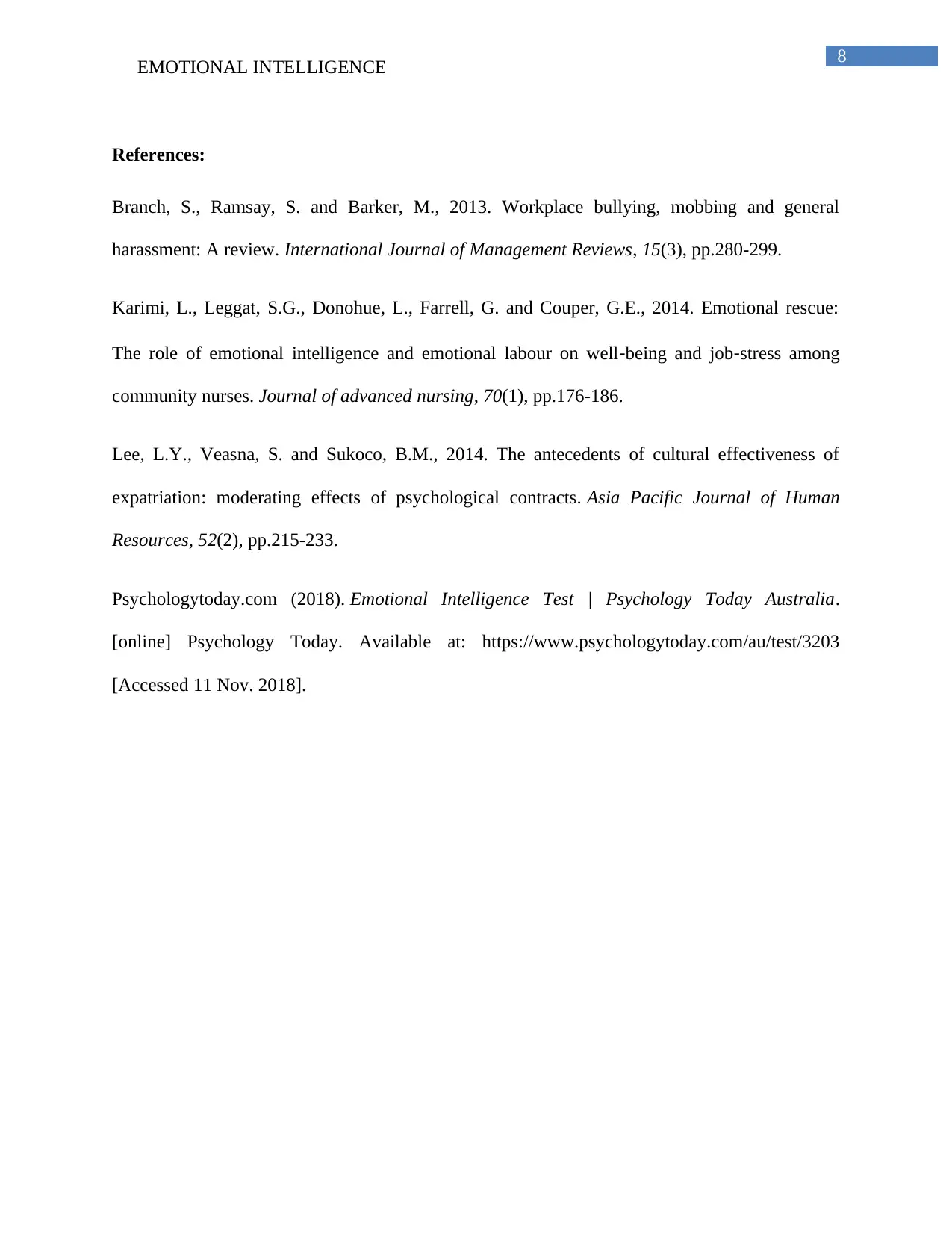
8
EMOTIONAL INTELLIGENCE
References:
Branch, S., Ramsay, S. and Barker, M., 2013. Workplace bullying, mobbing and general
harassment: A review. International Journal of Management Reviews, 15(3), pp.280-299.
Karimi, L., Leggat, S.G., Donohue, L., Farrell, G. and Couper, G.E., 2014. Emotional rescue:
The role of emotional intelligence and emotional labour on well‐being and job‐stress among
community nurses. Journal of advanced nursing, 70(1), pp.176-186.
Lee, L.Y., Veasna, S. and Sukoco, B.M., 2014. The antecedents of cultural effectiveness of
expatriation: moderating effects of psychological contracts. Asia Pacific Journal of Human
Resources, 52(2), pp.215-233.
Psychologytoday.com (2018). Emotional Intelligence Test | Psychology Today Australia.
[online] Psychology Today. Available at: https://www.psychologytoday.com/au/test/3203
[Accessed 11 Nov. 2018].
EMOTIONAL INTELLIGENCE
References:
Branch, S., Ramsay, S. and Barker, M., 2013. Workplace bullying, mobbing and general
harassment: A review. International Journal of Management Reviews, 15(3), pp.280-299.
Karimi, L., Leggat, S.G., Donohue, L., Farrell, G. and Couper, G.E., 2014. Emotional rescue:
The role of emotional intelligence and emotional labour on well‐being and job‐stress among
community nurses. Journal of advanced nursing, 70(1), pp.176-186.
Lee, L.Y., Veasna, S. and Sukoco, B.M., 2014. The antecedents of cultural effectiveness of
expatriation: moderating effects of psychological contracts. Asia Pacific Journal of Human
Resources, 52(2), pp.215-233.
Psychologytoday.com (2018). Emotional Intelligence Test | Psychology Today Australia.
[online] Psychology Today. Available at: https://www.psychologytoday.com/au/test/3203
[Accessed 11 Nov. 2018].
⊘ This is a preview!⊘
Do you want full access?
Subscribe today to unlock all pages.

Trusted by 1+ million students worldwide
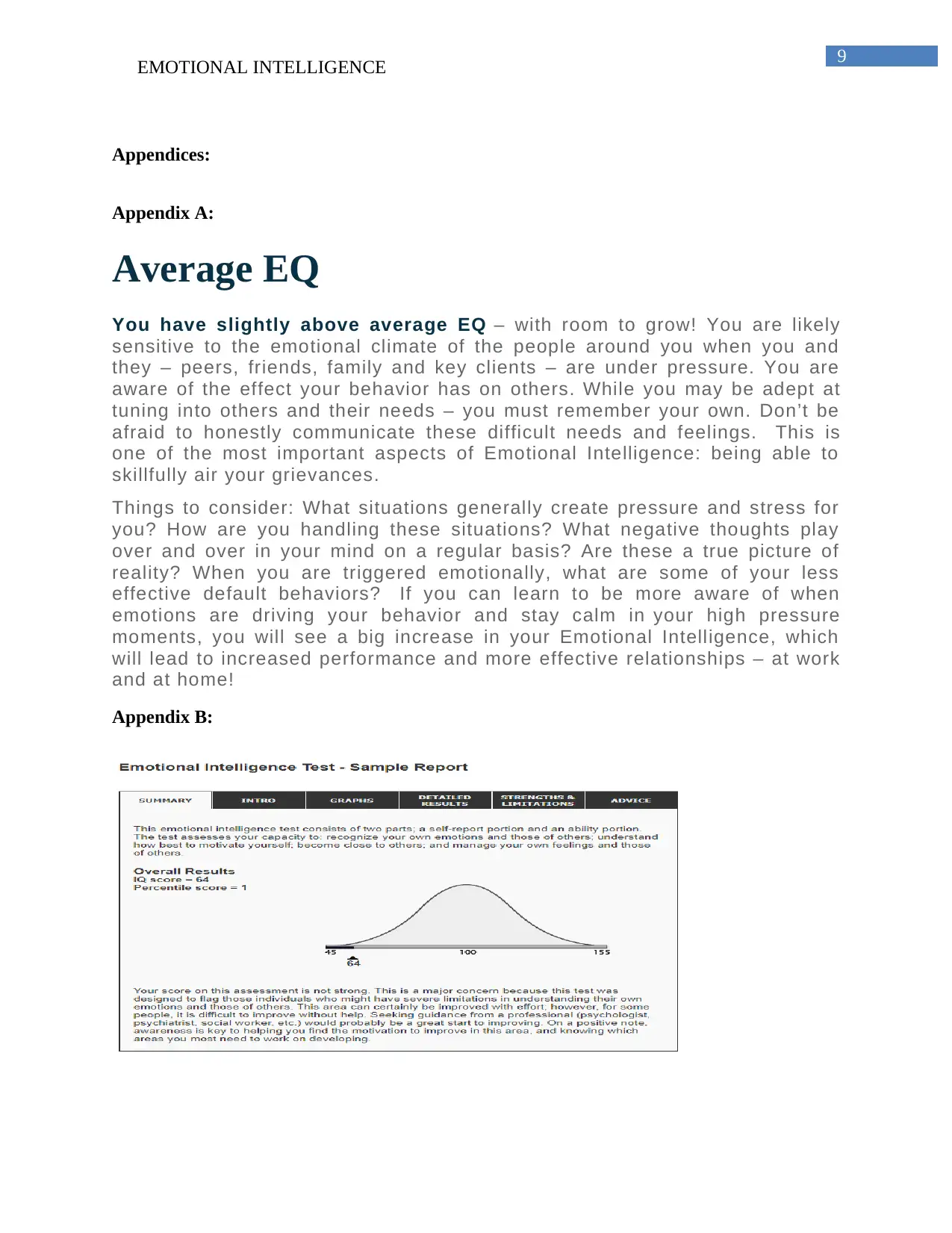
9
EMOTIONAL INTELLIGENCE
Appendices:
Appendix A:
Average EQ
You have slightly above average EQ – with room to grow! You are likely
sensitive to the emotional climate of the people around you when you and
they – peers, friends, family and key clients – are under pressure. You are
aware of the effect your behavior has on others. While you may be adept at
tuning into others and their needs – you must remember your own. Don’t be
afraid to honestly communicate these difficult needs and feelings. This is
one of the most important aspects of Emotional Intelligence: being able to
skillfully air your grievances.
Things to consider: What situations generally create pressure and stress for
you? How are you handling these situations? What negative thoughts play
over and over in your mind on a regular basis? Are these a true picture of
reality? When you are triggered emotionally, what are some of your less
effective default behaviors? If you can learn to be more aware of when
emotions are driving your behavior and stay calm in your high pressure
moments, you will see a big increase in your Emotional Intelligence, which
will lead to increased performance and more effective relationships – at work
and at home!
Appendix B:
EMOTIONAL INTELLIGENCE
Appendices:
Appendix A:
Average EQ
You have slightly above average EQ – with room to grow! You are likely
sensitive to the emotional climate of the people around you when you and
they – peers, friends, family and key clients – are under pressure. You are
aware of the effect your behavior has on others. While you may be adept at
tuning into others and their needs – you must remember your own. Don’t be
afraid to honestly communicate these difficult needs and feelings. This is
one of the most important aspects of Emotional Intelligence: being able to
skillfully air your grievances.
Things to consider: What situations generally create pressure and stress for
you? How are you handling these situations? What negative thoughts play
over and over in your mind on a regular basis? Are these a true picture of
reality? When you are triggered emotionally, what are some of your less
effective default behaviors? If you can learn to be more aware of when
emotions are driving your behavior and stay calm in your high pressure
moments, you will see a big increase in your Emotional Intelligence, which
will lead to increased performance and more effective relationships – at work
and at home!
Appendix B:
Paraphrase This Document
Need a fresh take? Get an instant paraphrase of this document with our AI Paraphraser

10
EMOTIONAL INTELLIGENCE
EMOTIONAL INTELLIGENCE
1 out of 11
Related Documents
Your All-in-One AI-Powered Toolkit for Academic Success.
+13062052269
info@desklib.com
Available 24*7 on WhatsApp / Email
![[object Object]](/_next/static/media/star-bottom.7253800d.svg)
Unlock your academic potential
Copyright © 2020–2026 A2Z Services. All Rights Reserved. Developed and managed by ZUCOL.




